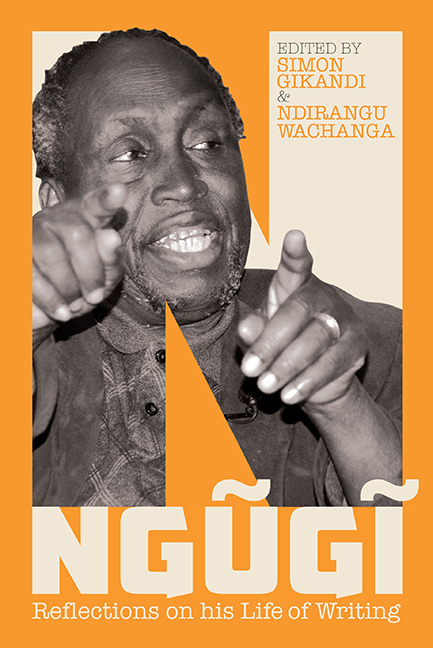Book contents
- Frontmatter
- Contents
- Preface
- Acknowledgements
- Chronology
- Photographic Section
- Introduction: Ngũgĩ wa Thiong'o: Reflections on His Life of Writing
- Ngũgĩ at Work
- Part I Serenades & Beginnings
- 1 Hyperbolic Praise Poetry for Ngũgĩ @80 … In Imitation of African Orature
- 2 A Song at Dawn (for Ngũgĩ wa Thiong'o)
- 3 Ngũgĩ in Eritrea
- 4 Up From Makerere: On the Publication of Weep Not, Child
- 5 Encountering Ngũgĩ at Leeds: An Interview with Peter Nazareth
- 6 The Book that Made Me: On Weep Not, Child
- 7 Note from a Literary Son
- 8 What is in a Name?
- 9 In Exile: Between Britain & Kenya
- Part II Memories, Recollections & Tributes
- Part III Working with Ngũgĩ
- Part IV The Writer, the Critic & the World
- Part V The Other Ngũgĩ
- Appendixes
- References
- Bibliography of Ngũgĩ's Primary Works
- Works Cited
- Notes on Contributors
- Index
9 - In Exile: Between Britain & Kenya
from Part I - Serenades & Beginnings
Published online by Cambridge University Press: 27 July 2019
- Frontmatter
- Contents
- Preface
- Acknowledgements
- Chronology
- Photographic Section
- Introduction: Ngũgĩ wa Thiong'o: Reflections on His Life of Writing
- Ngũgĩ at Work
- Part I Serenades & Beginnings
- 1 Hyperbolic Praise Poetry for Ngũgĩ @80 … In Imitation of African Orature
- 2 A Song at Dawn (for Ngũgĩ wa Thiong'o)
- 3 Ngũgĩ in Eritrea
- 4 Up From Makerere: On the Publication of Weep Not, Child
- 5 Encountering Ngũgĩ at Leeds: An Interview with Peter Nazareth
- 6 The Book that Made Me: On Weep Not, Child
- 7 Note from a Literary Son
- 8 What is in a Name?
- 9 In Exile: Between Britain & Kenya
- Part II Memories, Recollections & Tributes
- Part III Working with Ngũgĩ
- Part IV The Writer, the Critic & the World
- Part V The Other Ngũgĩ
- Appendixes
- References
- Bibliography of Ngũgĩ's Primary Works
- Works Cited
- Notes on Contributors
- Index
Summary
On January 11, 1985, Kenya's President Daniel arap Moi held a two-hour meeting with Sir Geoffrey Howe, the British Secretary of State for Foreign and Commonwealth Affairs who had called on him in Nairobi. Several issues were discussed during the meeting, among them trade and diplomatic relations. But it was the President's concern over the activities of Kenyan academic and writer Ngũgĩ wa Thiong'o, who was living in exile in London, that dominated the meeting.
Declassified British government documents show that Moi accused Ngũgĩ—now a professor based in the United States—of conducting propaganda among Kenyan students in the UK and planning to start a communist party. President Moi also wondered why Britain had allowed Ngũgĩ to live and work freely yet when the President's son Gideon—now Baringo senator and KANU chairman—visited London he needed a visa to stay even for a day. The President's demand was clear: Britain should reject any visa extension application by the Kenyan academic and force him to relocate to another country. But, according to the declassified documents, the Secretary of State told Moi that it was impossible for the British government to take any action against Ngũgĩ unless he committed a criminal offence. The British official also suggested that ignoring Ngũgĩ was a better strategy to avoid giving him publicity.
The renowned author had been detained for a year in 1977 by the Jomo Kenyatta government after his Gikuyu play Ngaahika Ndeenda (‘I will Marry When I Want’), written with Ngũgĩ wa Mĩriĩ, was performed in an open-air theatre in Limuru. After his release, Moi, who took over in 1978, blacklisted him and no university wanted to employ him. In 1982, after the launch of his book, Devil on the Cross, in Britain, Ngũgĩ feared for his life and did not return to Kenya. He would remain in exile in the UK until 1989 when he moved to the USA.
Moi's meeting was not the first time Kenya was expressing concern about Ngũgĩ's stay in Britain. Another declassified document marked ‘confidential’ shows the matter had been raised on November 12, 1984 by the Kenyan High Commissioner to London Benjamin Kipkulei when he called on the British Secretary of State. Kipkulei reportedly said Ngũgĩ was receiving more attention than he deserved.
- Type
- Chapter
- Information
- NgugiReflections on his Life of Writing, pp. 57 - 60Publisher: Boydell & BrewerPrint publication year: 2018



